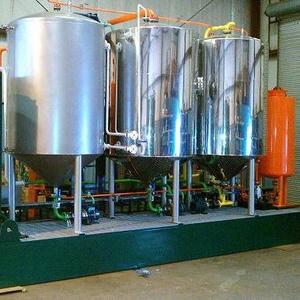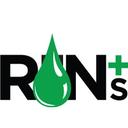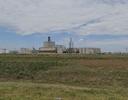Loyola University Chicago upgrades biodiesel lab, equipment

Photo: Ernie DeMartino, Biodiesel Experts Int'l
August 21, 2013
BY Ron Kotrba
Loyola University Chicago is expanding its biodiesel laboratory with much-needed additional space, and a new processor and analysis instrumentation. Lab manager Zach Waickman says Loyola built the school’s biodiesel program over the past five years to be a hands-on application, real-world, experiential learning piece of sustainability education at Loyola. The university was recently awarded a P3 (people, prosperity and planet) award from U.S. EPA to utilize living machine technology to clean biodiesel wash water as part of its ongoing sustainability efforts. The new lab will help facilitate this and other student-led projects.
“We were space-constrained, and limited to what we could do in that space,” said Waickman. The old lab, only 425 square feet, included a crude 2,000-gallon-per-year (gpy) processor and Waickman’s office space. Inputs like methanol had to be stored elsewhere and carted in, and the lab’s bulk biodiesel storage was also inconveniently located off-site. In the new lab, everything will be fully connected in a 3,000-square-foot space integrating biodiesel production, bulk storage, soap processing, product development, research and testing. “We were in a separate building before, two blocks off campus,” Waickman said. “Now we’ll be in a single building with all the other environmental projects.” The heating and cooling is coupled with the biodiesel generator in the basement, and 90 percent of the heating and cooling needs in the building will come from biodiesel and geothermal. Now, instead of draining glycerin one graduated cylinder at a time, for example, it’ll be piped over to the new methanol distillation apparatus.
Biodiesel Experts International was contracted to provide the lab’s new biodiesel production unit. BEI owner Ernie DeMartino said the unit is a traditional chemical batch system, but all the piping is color-coded for educational purposes, and there are site glasses on all the tanks. The skid-mounted unit also has separate flash evaporation for biodiesel and glycerin. The new system is scaled at 100,000 gpy, but Waickman says his goal is to produce about 30,000 gpy. Feedstock will remain used cooking oil from Loyola, Northwestern University and other area colleges. Most of the fuel produced is sold back to area college shuttle buses, with the rest going to private wholesale by appointment.
While the biodiesel lab already has access to certain analytical equipment on campus, new instruments are being obtained to conduct oxidation stability and other critical tests for water and sediment, sulfur, free and total glycerin, and others. “For us, it’s about students getting hands-on experience with analytical equipment and quality control process and techniques,” Waickman said.
Advertisement
Advertisement
The LUC biodiesel lab is working closely with many other colleges to ultimately get similar sustainability programs running on their campuses.
Advertisement
Advertisement
Related Stories
Biodiesel capacity in the U.S. and Canada dipped slightly stable in 2024, with several renewable diesel producers reporting headwinds and lower margins alongside a drove of SAF projects in various stages of development.
The IEA’s Task 39 group has new research regarding the development and status of the sustainable aviation fuel industry.
The U.S. EPA on Nov. 16 released updated RIN data, reporting that nearly 2.11 billion RINs were generated under the RFS in October, up from 1.81 billion generated during the same month of last year.
Conestoga to host SAFFiRE cellulosic ethanol pilot plant
Conestoga Energy and SAFFiRE Renewables LLC announced on Nov. 16 their agreement for Conestoga to host SAFFiRE’s cellulosic ethanol pilot plant at Conestoga’s Arkalon Energy ethanol facility in Liberal, Kansas.
Officials at Calumet Specialty Products Partners L.P. discussed the company’s proposed plans to boost sustainable aviation fuel (SAF) production at its Montana Renewables biorefinery during third quarter earnings call, held Nov. 9.
Upcoming Events










